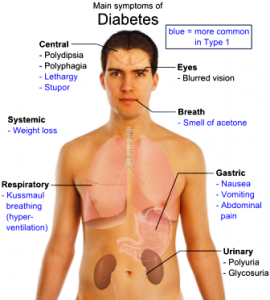Drug Company Broken Promises — More Worries for Diabetics
Diabetes is a scourge that has prematurely taken my father and other dear members of my family. It is a disease that many others in my family deal with each and every day. We leave in fear of the devastating complications suffered by our loved ones – amputations, heart attacks, blindness, etc. For decades, this fear has become a driving force in our search for cures, answers, and treatments. We have read with interest all of the reports of new breakthroughs in science and medicine, have tried to enroll in clinical studies in hopes of finding a cure, participated in the walk-a-thons and other fundraisers, and have been excited, time and again, as new drugs were brought to market. With each new drug came lots of promises, promises so significant that we were willing to pay top-dollar in hopes of better health and a better life.
The first of these “breakthroughs” was Rezulin (troglitazone), which was approved by the FDA in 1997 as the first of a new class of insulin-sensitizing drugs. It held so much promise for my family and others. In 1999, however, the FDA held hearings regarding safety concerns over Warner-Lambert’s blockbuster. Rezulin was saved in 1999, but ultimately pulled from the market in 2000 after a number of patients suffered liver failure and a reported 90 patients died due to hepatic toxicity associated with the drug. At that time, however, patients were reassured that they should not mourn the recall of Rezulin as both Avandia and Actos were newly-approved drugs in the same class, both of which touted themselves as being far safer than Rezulin.
Diabetics and their family members, including me, brushed ourselves off, and developed a new zeal for Avandia (rosiglitazone), which was approved by the FDA in 1999, amid as much if not more hype than had accompanied the approval of Rezulin a few years prior. That hope, however, was quickly dashed when reports of patients suffering congestive heart failure started to mount. By 2007, a number of Avandia patients had suffered heart attacks, strokes, and other serious cardiovascular injuries. Consumer groups and patient advocates screamed for the drug manufacturer and/or the FDA to pull the drug from the market. Instead, the tiny print on the drug warning label, one rarely seen by patients, was enhanced, while GlaxoSmithKline continued to prey upon diabetics desperate for a cure and sold billions of dollars worth of the drugs to one of the most fragile patient populations. It wasn’t until 2010-2011, after numerous diabetics died or suffered Avandia-induced injuries, that steps were implemented to withdraw rosiglitazone from widespread use. Truth be told, the drug was entering its twilight years anyway, so most of the benefit had already been reaped by the GlaxoSmithKline anyway.
I will always remember when Actos, the third drug in this class, made its big splash. The day after the safety risks associated with Avandia were widely disseminated by the media, Takeda, the manufacturer of Actos, took out full page, color advertisements in newspapers across the country to reassure diabetics that Actos would fulfill the promise that Rezulin and Avandia once held. Apparently, between 2007 and 2010, Takeda worked very hard to gain market share from GlaxoSmithKline by claiming that its drug was safer than Avandia and did not pose the same cardiovascular risks to patients, which apparently even led to legal/regulatory proceedings in the United Kingdom. Again, diabetics lined up, eager for a cure. Unfortunately, Actos may actually have failed patients even more than Avandia and Rezulin, yet, inexplicably, the drug remains on the market.
Takeda’s web site touts that it is currently the #1 prescribed brand-name diabetes drug, that more than 100 million prescriptions have been written, and that it is supported by more than 11 years of patient experiences. What is not prominent in these promotional pieces for the Actos family (which includes ACTOS, ACTOplus met, ACTOplus met XR, and Duetact) are the warnings for the very real safety issues associated with these drugs:
- Cardiovascular Injuries – Heart Attacks, Strokes, Congestive Heart Failure, Cardiovascular Death
- Macular Edema or Blindness
- Bladder Cancer
The marketing materials don’t clearly mention the numerous FDA safety alerts regarding issues with this drug from 2007 to the present:
- August 2007 Safety Alert regarding risk of drug exacerbating heart failure
- September 2010 Safety Alert regarding increased risk of bladder cancer in patients taking Actos (pioglitazone) for more than two years
- June 2011 Safety Alert regarding increased risk of bladder cancer in patients taking Actos for more than one year
- August 2011 Safety Alert regarding increased risk of bladder cancer in patients taking Actos for more than one year
The flashy materials on Takeda’s web site don’t mention that consumer watch groups and patient advocates, such as Public Citizen, have been raising concerns for years regarding the safety of ACTOS, Avandia and Rezulin:
- May 22, 2007 – Letter from Public Citizen to FDA regarding internal FDA data from 2002 expressing concern over an increased risk of heart failure in patients taking both Avandia as well as Actos
- July 15, 2000 – Letter from Public Citizen to the editors of Lancet, a leading British medical journal, noting that very few studies to support the effectiveness of thiazolidinediones (the drug class which includes Avandia, Actos, and Rezulin) were submitted to regulatory agencies prior to approval
So now what? Well, like Rezulin and Avandia before it, the final chapter for ACTOS will likely be written in our court system. With the recent announcements regarding the risks of bladder cancer associated with the drug, a number of patients, failed by the drug manufacturer and our drug safety system, have turned to our justice system. One can only hope that regulators and/or the drug manufacturer put patient safety first and remove this drug from the market before more diabetics are unnecessarily victimized by another unsafe drug.
Share This



